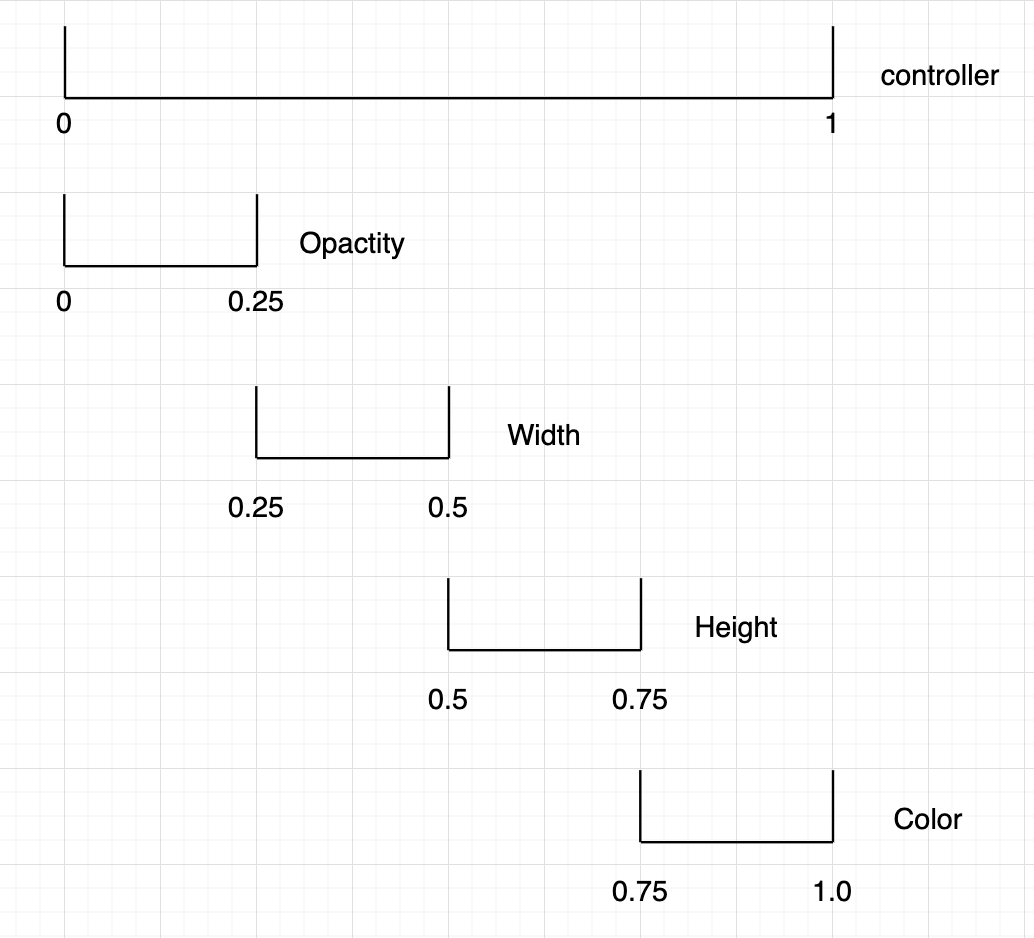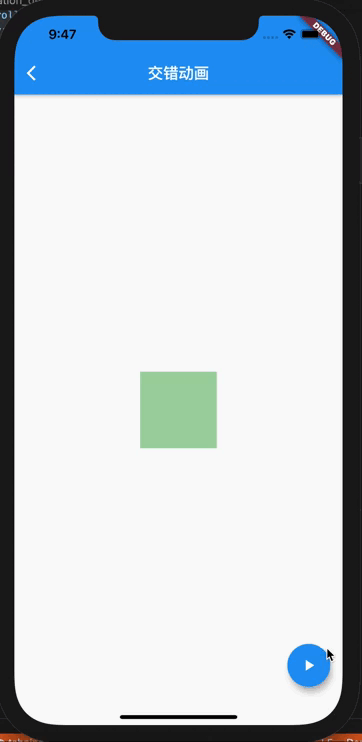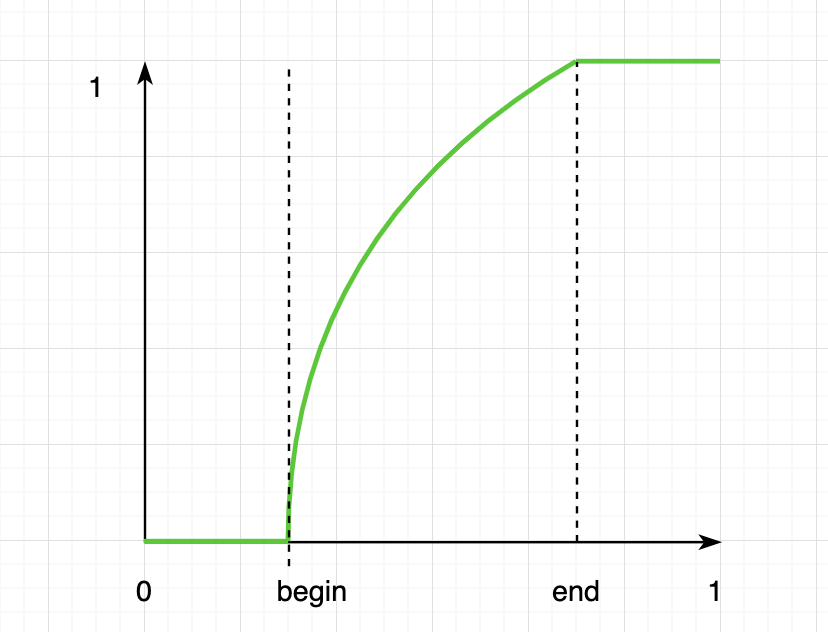Android Flutter GIF动画效果
岛上码农 人气:0前言
我们之前介绍了不少有关动画的篇章。前面介绍的动画都是只有一个动画效果,那如果我们想对某个组件实现一组动效,比如下面的效果,该怎么办?

staggered animation
这个时候我们需要用到组合动效, Flutter 提供了交错动画(Staggered Animation)的方式实现。对于多个 Anmation 对象,可以共用一个 AnimationController,然后在不同的时间段执行动画效果。这就有点像 GIF 图片一样,一帧帧图像播放实现连续的动画。
交错动画机制
交错动画的实现基于以下几个要点:
- 所有的 animation对象使用同一个
AnimationController驱动; - 不管实际动画持续的时间长度多长,动画控制器
controller的值必须在0-1之间; - 每个动画对象都有一个0-1范围内的间隔(
Interval); - 在间隔时间内,
Tween对象从起始值过渡到结束值。 - 由
AnimationController统一管理这些Tween 产生的Animation对象。
听起来有点抽象,我们以一张图来表述就清晰多了,假设我们有4个动画对象,分别控制组件的透明度(Opacity),宽度(Width),高度(Height)和颜色(Color),交错动画过程如下:

时序示意图
controller 是一个从0到1的归一化的动画控制,其实对应的就是动画时长的归一化。然后 Opacity 透明度动效占据了0-0.25区间;Width 占据了0.25-0.5区间;Height 占据了0.5-0.75区间;最后是 Color 占据了0.75-1.0的区间。区间对应就是动画的时间间隔,只是每个区间内的Tween 动画对象的取值范围都是0-1以控制从起始值到结束值。我们可以理解为是 AnimationController 将多个 Animation 对象按序(也可以重合)拼接起来形成复合形式的动画。
代码实现
看上面的说明是不是觉得还有些难以理解,我们来一段示例代码就很容易明白了。下面的代码我们定义了一个共用的_controller,然后四段动画对象_opaticy,_width,_height 和_color。其中关键的实现是使用了 Tween 对象的 animate 方法,并指定了一个 CurvedAnimation 对象作为 其parent 参数。而这个CurvedAnimation实际使用 Interval 来切分_controller 的动画时间,从而可以将多个 Animation 对象组合起来。
import 'package:flutter/material.dart';
class StaggeredAnimationDemo extends StatefulWidget {
StaggeredAnimationDemo({Key? key}) : super(key: key);
@override
_StaggeredAnimationDemoState createState() => _StaggeredAnimationDemoState();
}
class _StaggeredAnimationDemoState extends State<StaggeredAnimationDemo>
with SingleTickerProviderStateMixin {
late AnimationController _controller;
late Animation<double> _opacity;
late Animation<double> _width;
late Animation<double> _height;
late Animation<Color?> _color;
@override
void initState() {
_controller =
AnimationController(duration: Duration(seconds: 2), vsync: this)
..addListener(() {
setState(() {});
});
_opacity = Tween<double>(begin: 0.5, end: 1.0).animate(
CurvedAnimation(
parent: _controller,
curve: Interval(
0.0,
0.25,
curve: Curves.easeIn,
),
),
);
_width = Tween<double>(begin: 0.0, end: 2.0).animate(
CurvedAnimation(
parent: _controller,
curve: Interval(
0.25,
0.5,
curve: Curves.easeIn,
),
),
);
_height = Tween<double>(begin: 0.0, end: 2.0).animate(
CurvedAnimation(
parent: _controller,
curve: Interval(
0.5,
0.75,
curve: Curves.easeIn,
),
),
);
_color = ColorTween(begin: Colors.green, end: Colors.blue).animate(
CurvedAnimation(
parent: _controller,
curve: Interval(
0.75,
1.0,
curve: Curves.easeIn,
),
),
);
super.initState();
}
@override
Widget build(BuildContext context) {
return Scaffold(
appBar: AppBar(
title: const Text('交错动画'),
),
body: Center(
child: Opacity(
opacity: _opacity.value,
child: Container(
width: 100 + 100 * _width.value,
height: 100 + 100 * _height.value,
color: _color.value,
),
),
),
floatingActionButton: FloatingActionButton(
child: Icon(Icons.play_arrow),
onPressed: () {
if (_controller.isCompleted) {
_controller.reverse();
} else if (!_controller.isAnimating) {
_controller.forward();
}
},
),
);
}
}我们来看一下运行效果,可以看到运行的动画过程其实就是4段动画效果拼接来的,先是透明度改变,然后是宽度改变,再之后是高度改变,最后是颜色的改变。

运行效果
Interval 介绍
我们来看一下关键的 Interval 类的介绍。
A curve that is 0.0 until [begin], then curved (according to [curve]) from 0.0 at [begin] to 1.0 at [end], then remains 1.0 past [end].
Interval 类继承自 Curve,所不同的是,在 begin 之前曲线的值一直保持为0.0,而在 end 之后一直保持为1.0。所以可以理解为,在 AnimationController 启动动画后,Interval 曲线其实也已经在绘制,只是有效的取值区间只在 begin 到 end 之间,下面就是 Interval 的一种示例曲线图。

image.png
从 Interval 的源码也能看出来,其中 clamp 方法限制了取值范围,当 t <= begin 的时候取值就是0,当 t >= end的时候,取值就是1.0。
@override
double transformInternal(double t) {
assert(begin >= 0.0);
assert(begin <= 1.0);
assert(end >= 0.0);
assert(end <= 1.0);
assert(end >= begin);
t = ((t - begin) / (end - begin)).clamp(0.0, 1.0);
if (t == 0.0 || t == 1.0)
return t;
return curve.transform(t);
}
总结
本篇介绍了交错动画的实现机制和示例,通过交错动画给了我们更多动效组合的空间,从而可以实现类似 GIF图片的那种多帧组合在一起的动画效果。
加载全部内容